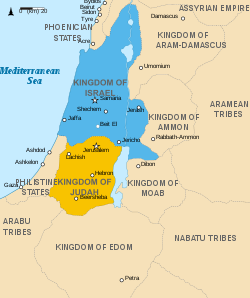Kingdom of Israel (Samaria)
| Kingdom of Israel | ||||||||||
| Kingdom | ||||||||||
|
||||||||||
|
Map of Israel and Judah in the 9th century BCE
|
||||||||||
| Capital |
Shechem (930 BCE) Penuel (930–909) Tirzah (909–880) Samaria (880–720) |
|||||||||
| Languages | Hebrew | |||||||||
| Religion |
Monolatristic or monotheistic Yahwism Canaanite polytheism Mesopotamian polytheism Folk religion |
|||||||||
| Government | Monarchy | |||||||||
| Historical era | Classical Antiquity | |||||||||
| • | Independence (from United Monarchy) | 930 BCE | ||||||||
| • | Destruction (by Assyria) | 720 BCE | ||||||||
|
||||||||||
According to the Hebrew Bible, the Kingdom of Israel (Hebrew: מַמְלֶכֶת יִשְׂרָאֵל, Modern Mamlekhet Yisra'el, Tiberian Mamléḵeṯ Yiśrāʼēl) was one of two successor states to the former United Kingdom of Israel and Judah. Historians often refer to the Kingdom of Israel as the "Northern Kingdom" or as the "Kingdom of Samaria" to differentiate it from the Southern Kingdom of Judah.
Modern scholarship, incorporating textual criticism and archaeology, has challenged the biblical account that the northern kingdom of Israel broke off from a united monarchy with the southern kingdom of Judah, suggesting instead that the northern civilization of Israel developed independently of Judah (a comparatively small and rural area), and that it first reached the political, economic, military and architectural sophistication of a kingdom under the Omride dynasty around 884 BCE.
The Kingdom of Israel existed roughly from 930 BCE until 720 BCE, when it was conquered by the Neo-Assyrian Empire. The major cities of the kingdom were Shechem, Tirzah, and Shomron (Samaria).
In the Hebrew Bible, the Kingdom of Israel has been referred to as the "House of Joseph". It is also frequently referenced (particularly in poetry) as Ephraim, the tribe whose territory housed the capital cities and the royal families. It has also been referred to as "Israel in Samaria".
...
Wikipedia

